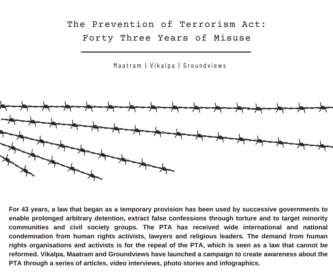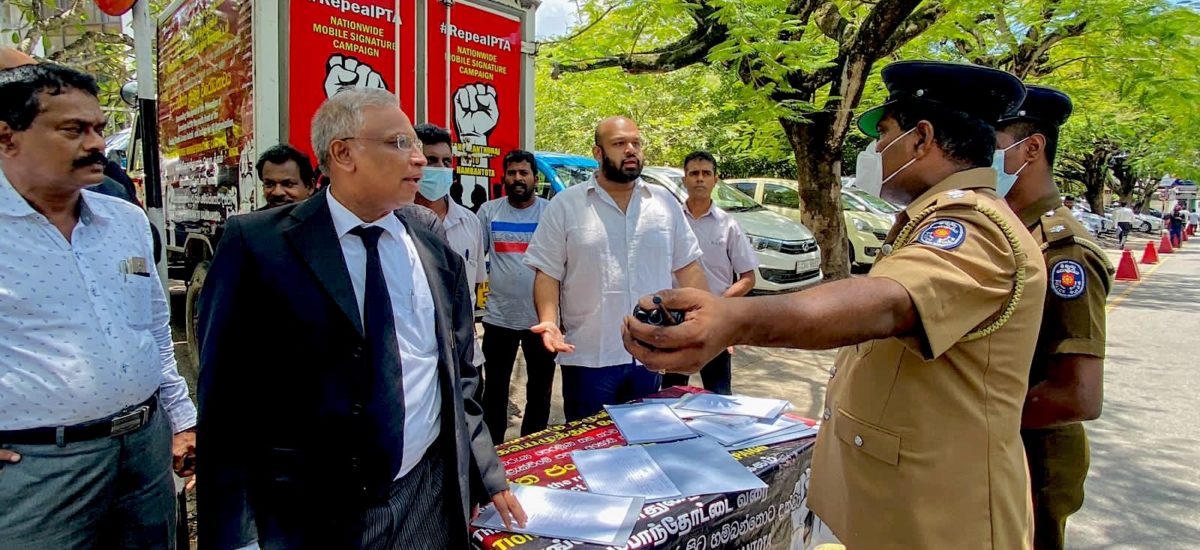Photo courtesy of Twitter
It was supposed to be a temporary law to fight the perceived threat of a militant uprising but it has remained for over 40 years, enduring even after the enemy has been defeated. Hundreds of people have been in prison for years, even decades, awaiting trial on terrorism charges or following convictions based on confessions extracted using torture. The Human Rights Commission of Sri Lanka (HRCSL) said it recorded 109 arrests under the PTA in 2021.
Today the Prevention of Terrorism Act (PTA) is being used to supress dissent and harass peaceful protesters; three young people are in detention without charge or access to judicial scrutiny. They may be there legally for 12 months but many others taken in under this arbitrary law have been detained for more than a decade, languishing in remand without knowing on what charge they have been held. In June, the government announced it had been applying a moratorium on the use of the PTA since March and then went back on its word by detaining the three student leaders under the law in August.
Complete statistics on how many people have been arrested and held or for how long they have been in prison since the PTA became operational in 1979 are not known by human rights activists, researchers or lawyers. The majority of those detained are Tamils taken in for alleged links with the LTTE but more recently, several hundred Muslims were arrested after the Easter Sunday attacks. Many remain in jail while others have been released without charge after many months in detention.
A 2020 report by the HRCSL found that as of September 2018, at least 29 PTA prisoners had spent five to 10 years on remand (pretrial detention) and 11 had spent 10 to 15 years on remand. The longest period a person had been in remand before trial was then 15 years. The longest period a trial had been ongoing was 16 years. The study also found that about 84 percent of PTA prisoners are tortured after their arrest and over 90 percent of those were forced to sign a document in a language, Sinhala, they could not understand. Very often, PTA prisoners are denied proper access to legal representation.
While high profile cases such as Hejaaz Hizbullah and Ahfnaz Jazeem have had international and national exposure, many hundreds still remain powerless and voiceless.
Currently an islandwide signature campaign is ongoing to repeal the PTA headed by politicians, lawyers and activists who say that amending the law will not suffice. The campaign started in Kankesanthurai on September 10 and will end on October 5 in Hambantota having covered all district of the country. ITAK MP M.A. Sumanthiran hailed the campaign as an uniting factor between those in the north and the south, pointing out that those in south were feeling the effects of the PTA for the first time. Representatives of several political parties have signed the petition, including some local level SLPP members, as have farmers, fishermen, factory workers and religious leaders.
The organisers see it more as a campaign to raise awareness rather than one that will actually get the PTA repealed no matter how many signatures they collect. “Many people who had never heard of PTA are now aware of it. They will carry the message to others throughout their districts. We will campaign very hard in an unified voice until PTA is repealed.
“Compared to March this year, I can see that there’s more awareness about the PTA and the need to repeal it among the public. However, the ruling government party’s response has not changed,” said one of organisers of the campaign, Shanakiya Rasamanickam, ITAK’s MP for Batticaloa.
“One way bring the message to the government is awareness. More and more people need to know how draconian and dangerous this law actually is. They are under the impression that policemen are fair, honourable and impartial and that the Attorney General is independent and fair minded. In reality this is not the case. They are racist, sexist, money minded, corrupt and biased,” said Hejaaz Hizbullah, who has first-hand experience on the arbitrary nature of the PTA.
International human rights organisations including Human Rights Watch, Amnesty International and the Sri Lanka Campaign for Truth and Justice as well as the International Committee of Jurists have called for the PTA to be repealed because of its arbitrary and vague nature.
The EU, the US, the UK and other major donors have repeatedly asked Sri Lanka to improve its human rights record, citing the PTA as a main example of an unjust law that does not meet international human rights standards.
Five necessary prerequisites for the PTA to comply with international law are: employ definitions of terrorism consistent with international norms; ensure legal certainty, especially where it may impact rights to freedom of expression, opinion, association, and religion or belief; include provisions to prevent and halt arbitrary deprivation of liberty; include provisions to prevent torture and enforced disappearance; and provide due process and fair trial guarantees, including judicial oversight and access to legal counsel.
The government made some token amendments in March but they do not go far enough. While the government claimed to have reviewed and reformed the PTA, and announced its intention to replace it with a more comprehensive national security legislation in accordance with international best practices, the High Commissioner for Human Rights said in a report in September this year that while the amendments improved some safeguards, they retained most of the problematic provisions.
Many lawyers maintain that, with the threat of terrorism now abated, a special law for its prevention is not necessary. “The Penal Code, the Firearms Ordinance, the Explosives Ordinance and many other laws are sufficient and there is no need for a separate terrorism law,” said lawyer Ghazali Hussain, a former Human Rights Commissioner who handles several PTA cases.
Lawyers working with PTA detainees pointed out that most had been taken in for the flimsiest of reasons, often without evidence. The fact that they can be detained for 12 months without coming before a magistrate means that the police have enough time to manufacture evidence and intimidate others into giving false testimony.
“Anyone can be arrested under the PTA, even you or me. Student leader Wasantha Mudalige was arrested for burning VIPs’ houses but what about the people who attacked the peaceful protesters at GotaGoGama? No PTA for them?” asked Mr. Hizbullah.
While people have been arrested for attending a lecture or having an image on their phone or for delivering food to a suspect, known LTTE fighters such as Karuna and Pillayan are given government positions despite well documented evidence of their involvement in heinous crimes.
It is not only the detainees who suffer but also their families. In most cases, the men were the sole support for the families and women were left to fend for themselves, shunned by society and facing discrimination.
“A 29 year old man was arrested for posting a photo on Facebook that they said promoted terrorism. He was in jail for two years. A government officer, he lost job and his passport is taken so he cannot for abroad for work. Countless lives have been destroyed over the decades,” Mr. Rasamanickam said.
“Friends of Sri Lanka—including the European Union, United States, and United Kingdom, as well as the United Nations—should hold the Sri Lankan government to its commitments and withdraw their support from the country’s counterterrorism apparatus until there are concrete, time-bound steps to end abuses and to repeal the PTA. The EU should insist that Sri Lanka meet its human rights commitments, in exchange for which it receives tariff-free access to European markets, by requiring immediate and genuine action to revoke the PTA and ensure any new counterterrorism legislation meets international human rights standards,” said Human Rights Watch in a report on the PTA earlier this year.
Despite being in force for 43 years, the PTA did little to curb the excesses of the LTTE or prevent the Easter Sunday attacks. Instead, it has been used to supress dissent, imprison political opponents and intimidate minority communities to silence their fight for their rights. Therefore the PTA must be repealed as it cannot be reformed.

View this post on Instagram

